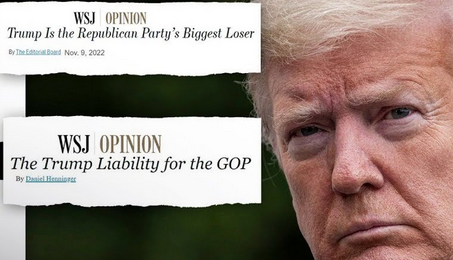Photos: YouTube
The most compelling news doesn’t trickle, it comes in floods. This week we were set for a big package on the midterm elections in the United States. Pundits were predicting a red wave that would act as a rebuke to the Democrats and to President Joe Biden. At the same time, amid growing chatter in Washington and the capitals of Europe about talks between Ukraine and Russia, we had prepared a series of articles on the money and security guarantees that the country would need after the fighting had stopped.
As it turned out, we witnessed upsets on almost every front. The midterms produced a series of results that were much closer to our model than to the pundits’ predictions: a red trickle rather than a red wave. What is more, the problem for Republicans lay with MAGA candidates backed by the former president, Donald Trump.
His handpicked candidates turned winnable Senate races into nail-biters in Arizona, Georgia, Nevada and Pennsylvania. Two Republican candidates for governor closely associated with Trumpism—Doug Mastriano in Pennsylvania and Tim Michels in Wisconsin—both vowed to use their influence over election administration to prevent “electoral fraud”. It was they who lost. In Michigan and Nevada Republican candidates who swore the 2020 election was stolen ran for secretary of state so that they might oversee the next one. They lost, too. Meanwhile in Florida, Governor Ron DeSantis, a probable rival of Mr Trump’s for the Republican nomination in 2024, won by roughly 20 points. The Trump effect became the subject of our cover leader in most of our editions.
In Europe, however, we continued to focus on Ukraine. Again, news was the reason. On Wednesday, as we were pulling together the edition, we heard reports that Russian troops were retreating from Kherson, the only regional capital that they had captured since the invasion. That brought our coverage of Ukraine’s war aims centre-stage.
The war has lurched from one encounter to the next without a clear sign of how it would end. By thinking about the ingredients for a stable, thriving and democratic Ukraine, we worked back to the conditions today that would be needed to bring it about. Our analysis was informed by the latest thinking about rebuilding Ukraine and about the security guarantees that Ukraine would need. Our conclusion is that Vladimir Putin is a threat to all of western Europe, and that its members therefore need to cement their commitment to the place doing the most to stand up to him.
Last, as if to cap the drama, the crypto-world came crashing down. After rumours began to swirl that FTX, once the industry’s third-biggest exchange, might be insufficiently liquid, customers pulled $650m of assets out on November 7th, before it stopped meeting requests. A day later a rescuer seemed to come forward to save FTX, only to walk away on November 9th. Cue crypto panic.
All told, a busy week—the very best sort.
The Economist\Zanny Minton Beddoes Editor-in-chief












